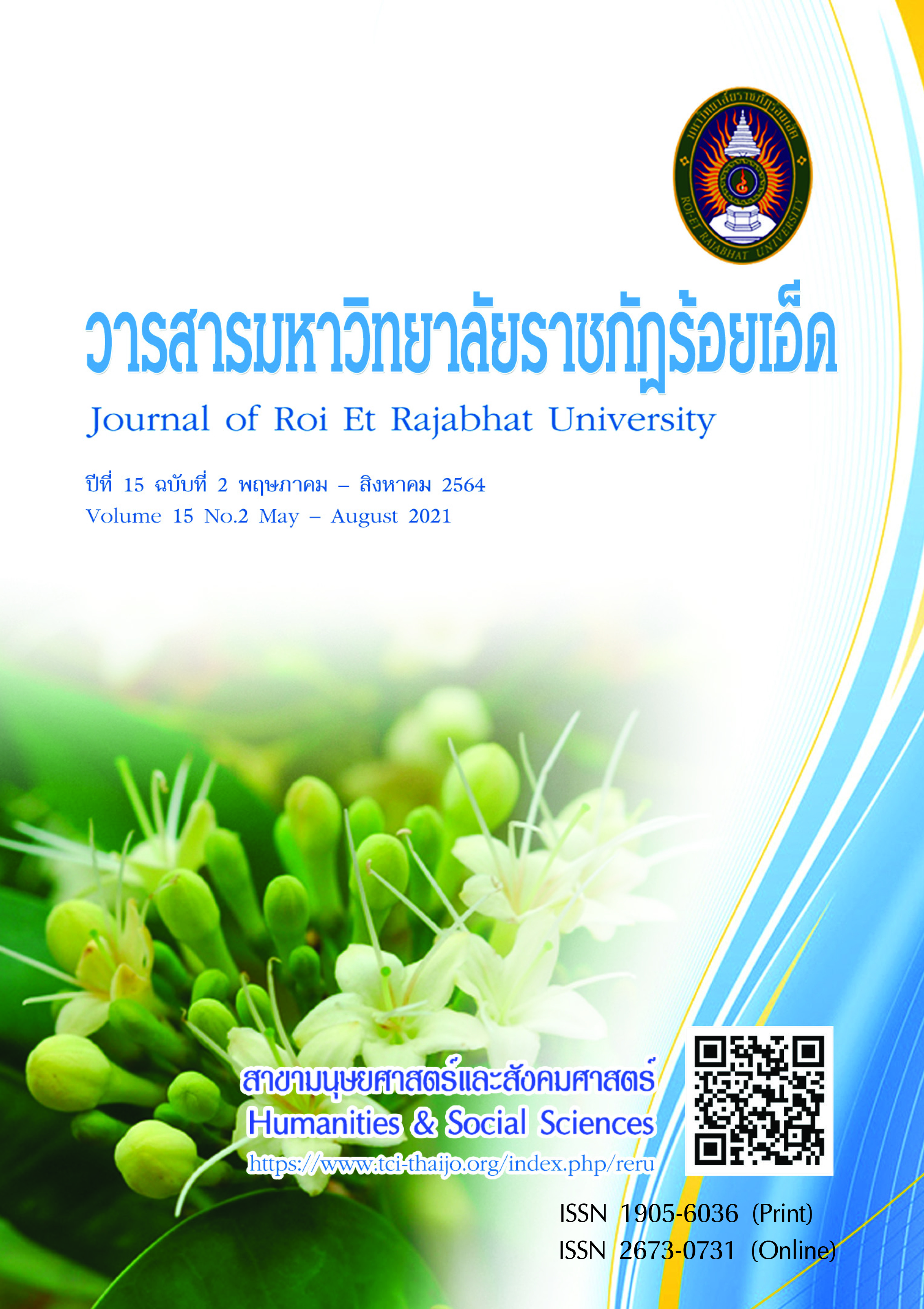A Model for Developing Integrative Leadership of Teachers in the Primary Schools Under the Office of Education Region 11
Keywords:
Factor analysis, , Developing model, Integrative leadershipAbstract
The purposes of this research were to 1) study the components of integrative leadership of teachers, 2) create and develop an integrative leadership development model for teachers in primary schools, and 3) find the effectiveness of the integrative leadership development model for teachers in primary schools. This research was a research and development by using mix method. There are 3 phases of research. Phase 1 studied the components of integrative leadership of teachers. Samples were 393 teachers. Compositions were confirmed by Factor analysis and Structural Equation Modeling Analysis (SEM). Phase 2 created and developed a model for developing integrative leadership of teachers and approved the validity of the model by 10 experts. Phase 3 experiment using the model for developing integrative leadership of teachers. The samples were 30 teachers. The findings were as follows: 1. The integrative leadership of primary school teachers consisted of 5 components as follows, 1) curriculum development, 2) learning management, 3) technology integration skills, 4) relation building and participation and 5) measurement and evaluation. The suitability of all 5 components were KMO = 0.949. Bartlett’s test of sphericity was statistically significant at 0.05 level. The results of data analysis were 2 = 1956.161, P-value = 0.001, CFI = 0.987, RMSEA = 0.016, NFI = 0.877, and TLI = 0.984. That showed the observed variables were able to measure the external variables of the integrative leadership of teachers. 2. The model of integrative leadership development of primary school teachers consisted of 1) principles, 2) objectives, 3) processes, 4) content, and 5) measurement and evaluation. There were 4 stages of the model development process as 1) training workshop, 2) professional learning community, 3) practice in actual setting, and 4) supervision, monitoring and evaluation. 3. The results of effectiveness of the integrative leadership development model of primary school teachers can be examined as follow, after the intervention, the teachers’ leadership behaviors ( = 4.56) was higher than pre-intervention behaviors (
= 2.91). And development assessment results of of the integrative leadership of teachers (
= 4.66), compared with post-intervention behaviors, were higher (
= 4.56) and the percentage of progression was 2.19%.
References
กษมน มังคละคีรี. (2557). รูปแบบการพัฒนาภาวะผู้นำครูเพื่อการประกันคุณภาพภายในสถานศึกษา สังกัดสำนักงาน
คณะกรรมการการศึกษาขั้นพื้นฐานในเขตตรวจราชการที่ 11. ดุษฎีนิพนธ์ ดุษฎีบัณฑิต สาขาวิชาภาวะผู้นำ
ทางการบริหารการศึกษา. สกลนคร: มหาวิทยาลัยราชภัฏสกลนคร.
ฐิติมา ไชยมหา. (2556). รูปแบบการพัฒนาภาวะผู้นำครูด้านการจัดการเรียนรู้ โรงเรียนมัธยมศึกษา สังกัดองค์การบริหาร
ส่วนจังหวัดในภาคตะวันออกเฉียงเหนือ. ดุษฎีนิพนธ์ ดุษฎีบัณฑิต สาขาวิชาภาวะผู้นำทางการบริหารการศึกษา.
สกลนคร: มหาวิทยาลัยราชภัฏสกลนคร.
เทพรังสรรค์ จันทรังษี. (2556). การพัฒนาภาวะผู้นำครูในโรงเรียนมาตรฐานสากลของโรงเรียนอนุบาลสกลนคร สำนักงาน
เขต พื้นที่การศึกษาประถมศึกษาสกลนคร เขต 1. ดุษฎีนิพนธ์ ดุษฎีบัณฑิต สาขาวิชาภาวะผู้นำทางการบริหาร
การศึกษา. สกลนคร: มหาวิทยาลัยราชภัฏสกลนคร.
กระทรวงศึกษาธิการ. (2560). แผนการศึกษาแห่งชาติ พ.ศ. 2560-2579. กรุงเทพฯ: พริกหวานกราฟฟิค จำกัด.
พิมพ์พันธ์ เดชะคุปต์ และพเยาว์ ยินดีสุข. (2560). ทักษะ 7C ของครู 4.0. กรุงเทพฯ: จุฬาลงกรณ์มหาวิทยาลัย.
วิโรจน์ สารรัตนะ. (2557). ภาวะผู้นำ. กรุงเทพฯ: ทิพยวิสุทธิ์.
สำนักงานศึกษาธิการภาค 11. (2562). ข้อมูลสารสนเทศด้านการศึกษา สำนักงานศึกษาธิการภาค 11 ประจำปีการศึกษา 2562.
กรุงเทพฯ: กระทรวงศึกษาธิการ.
สุกสะหวัน ไชยสมบัติ. (2556). ความต้องการในการศึกษาต่อสายอาชีวศึกษา ตามความคิดเห็นของนักเรียนและผู้ปกครองนักเรียน
ระดับมัธยมศึกษาในแขวงสะหวันนะเขตประเทศสาธารณรัฐประชาธิปไตยประชาชนลาว. ดุษฎีนิพนธ์ ดุษฎีบัณฑิต
สาขาวิชาภาวะผู้นำทางการบริหารการศึกษา. สกลนคร: มหาวิทยาลัยราชภัฏสกลนคร.
Angalet, G.W. (2000). A new leadership paradigm for the twenty-first century. Doctoral dissertation,
University of Delaware.
Diamantopoulos, A. and Siguaw, A.D. (2000). Introducing LISREL: A guide for the uninitiated. London:
Sage Publications.
Hatala, R.J. and Hatala, L.M. (2005). Integrative leadership. Canada: Friesens Corporation.
Printy, S.M., Marks, H.M. and Bowers, A.J. (2009). Integrated leadership: How principals and teachers share
transformational and instructional influence. Journal of School Leadership, 19(5), 504-532.
Yukl, G. (2010). Leadership in organizations (7th ed.). New Jersey: Pearson.
Downloads
Published
How to Cite
Issue
Section
License
บทความที่ได้รับการตีพิมพ์เป็นลิขสิทธิ์ของวารสารมหาวิทยาลัยราชภัฎร้อยเอ็ด
ข้อความที่ปรากฏในบทความแต่ละเรื่องในวารสารวิชาการเล่มนี้เป็นความคิดเห็นส่วนตัวของผู้เขียนแต่ละท่านไม่เกี่ยวข้องกับมหาวิทยาลัยราชภัฎร้อยเอ็ด และคณาจารย์ท่านอื่นๆในมหาวิทยาลัยฯ แต่อย่างใด ความรับผิดชอบองค์ประกอบทั้งหมดของบทความแต่ละเรื่องเป็นของผู้เขียนแต่ละท่าน หากมีความผิดพลาดใดๆ ผู้เขียนแต่ละท่านจะรับผิดชอบบทความของตนเองแต่ผู้เดียว





